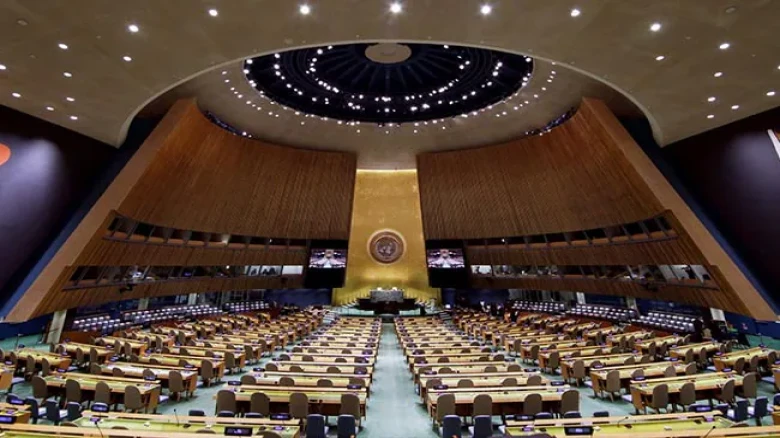Regional

India has abstained in the United Nations General Assembly (UNGA) on a resolution aimed at establishing an immediate humanitarian truce in the...
Digital Desk: India has abstained in the United Nations General Assembly (UNGA) on a resolution aimed at establishing an immediate humanitarian truce in the Israel-Hamas conflict, with the ultimate goal of ending hostilities and ensuring unhindered humanitarian access to the Gaza Strip. This decision comes as Israel launched a massive counter-offensive against Hamas following unprecedented attacks by the militant group, which resulted in the tragic deaths of over 1,400 people on October 7, 2023.
The UNGA, comprising 193 member states, convened a resumed 10th Emergency Special Session to vote on the draft resolution, which was submitted by Jordan and co-sponsored by over 40 nations, including Bangladesh, Maldives, Pakistan, Russia, and South Africa.
The resolution, titled "Protection of civilians and upholding legal and humanitarian obligations," received support from 120 nations, while 14 countries voted against it. Significantly, 45 countries, including India, chose to abstain from the vote. Other nations that abstained included Australia, Canada, Germany, Japan, Ukraine, and the UK.
A notable omission from the Jordanian-drafted resolution was any mention of the militant group Hamas. This omission drew strong criticism from the United States, which expressed outrage at the absence of any reference to Hamas in the document.
Prior to the UNGA vote on the resolution, an amendment was proposed by Canada and co-sponsored by the United States. This amendment sought to include a paragraph in the resolution unequivocally condemning the terrorist attacks by Hamas that initiated the conflict on October 7, 2023, and demanded the immediate and unconditional release of hostages in compliance with international law.
India sided with 87 other nations in voting in favor of the proposed amendment. However, the amendment failed to secure the two-thirds majority required for adoption, with 55 member states voting against it and 23 abstaining.
Dennis Francis, President of the 78th session of the UNGA, announced the failure of the draft amendment.
The Jordanian-drafted resolution called for an immediate, durable, and sustained humanitarian truce leading to a cessation of hostilities in the Israel-Hamas conflict. It also demanded the immediate, continuous, sufficient, and unhindered provision of essential goods and services to civilians in the Gaza Strip, including water, food, medical supplies, fuel, and electricity.
The resolution emphasized the necessity, under international humanitarian law, of ensuring that civilians have access to vital resources essential for their survival. It further called for "immediate, full, sustained, safe, and unhindered humanitarian access" for the United Nations Relief and Works Agency for Palestine Refugees in the Near East and other United Nations humanitarian agencies and their partners. The resolution also urged humanitarian access for the International Committee of the Red Cross and other humanitarian organizations.
These measures were intended to uphold humanitarian principles and facilitate the delivery of aid to civilians, including the establishment of humanitarian corridors.
However, the United States expressed strong dissatisfaction with the resolution's failure to mention Hamas and its exclusion of the term "hostage." Ambassador Linda Thomas-Greenfield, the U.S. representative to the UN, remarked before the vote that the omission of these critical terms amounted to "omissions of evil" and provided cover for Hamas' actions.
Thomas-Greenfield emphasized the importance of correcting these omissions, which led the United States to co-sponsor an amendment put forward by Canada. The amendment sought to address these concerns by explicitly condemning the terrorist attacks by Hamas and demanding the safety, well-being, and humane treatment of hostages in compliance with international law.
The resolution ultimately called for all parties to fully comply with their obligations under international law, including international humanitarian law and international human rights law. It stressed the protection of civilians, civilian objects, humanitarian personnel, and the facilitation of humanitarian access to Gaza.
The resolution also urged the rescinding of the order by Israel, the occupying power, to relocate Palestinian civilians, United Nations staff, humanitarian and medical workers from certain areas in the Gaza Strip to southern Gaza.
Furthermore, the resolution called for the immediate and unconditional release of all civilians held captive in violation of international law, demanding their safety, well-being, and humane treatment.
In the aftermath of this significant vote, the Israel-Hamas conflict continues to be a matter of international concern and debate, with India and several other countries abstaining from taking a clear stance on the resolution. The United Nations, despite the divisions within its member states, remains committed to addressing the crisis and promoting peace and humanitarian aid in the region.
Leave A Comment